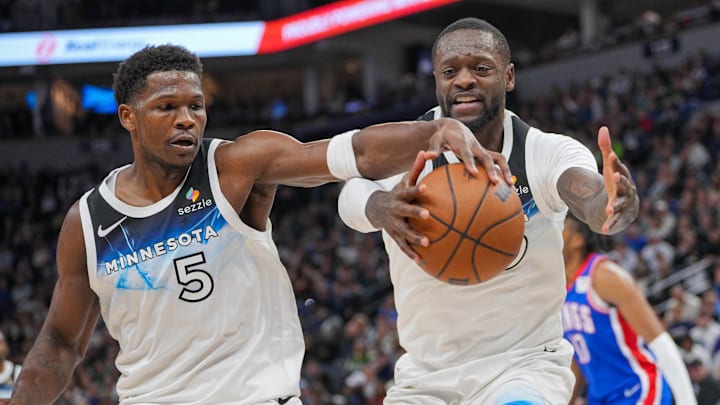For much of the current season, the focus on how to improve the Minnesota Timberwolves has been centered around their offense. The Wolves' defensive prowess is not too far removed from what they were able to do last season, but their offensive output has been severely lacking. Certain lineups have worked better in different situations, but it is clear that Julius Randle's skillset does not open Minnesota's offense up quite the way Karl-Anthony Towns' did.
Not to throw salt in the wound here, as we all know how major this problem is at this point. But one particular stat serves to highlight this problem in a way some have perhaps not considered. When you watch the Timberwolves, it seems that things work best when the ball moves a lot. No shocker here, as this is usually true of any good offense.
The eye test tells us that Anthony Edwards' life is easier and the Wolves perform better overall when the offense is free flowing and there's less ball-holding to stall things out. When you look at the numbers, this becomes even more apparent in a pretty shocking way.
According to official statistics, nine players in the NBA this season have been in isolation for at least 150 possessions where that play ended in either a shot or a pass. When sorted by points per possession, Anthony Edwards and Julius Randle rank eighth and ninth on that list.
There are 9 NBA players this season with at least 150 isolations that have resulted in either a shot attempt or a pass.
— ʜᴠ (@hoopvenue_) January 5, 2025
Here they are sorted by points per possession:
1. Jayson Tatum: 1.17
2. Kyrie Irving: 1.12
3. Shai Gilgeous-Alexander: 1.08
4. Giannis Antetokounmpo: 1.073… pic.twitter.com/02OJq3zDcQ
Edwards and Randle struggle to produce points in isolation
This really puts into perspective just how much the Timberwolves' top two scorers have struggled in one-on-one scenarios. Both Edwards and Randle have relatively low chances of putting points on the board either by scoring or playmaking when matched up with one defender in isolation.
If nothing else, this probably just reinforces how much Minnesota has to emphasize offensive sets where the ball swings and defenders get mixed up. Ant and Julius are both talented offensive players in their own right, but putting one defender in front of them and asking them to go get a bucket is clearly not working right now.
It is also worth noting that one reason Edwards' number is so low likely relates to how many possessions he gets double-teamed. If opponents are throwing two defenders at Ant late in the shot clock and he is having to throw a grenade to a teammate, there should be little shock that it's going to result in a shot clock violation or a missed shot most of the time.
